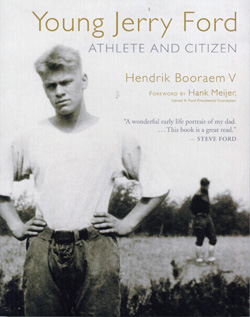Young Jerry Ford: Athlete and Citizen by Hendrik Booraem V; William B. Eerdmans Publishing Co.; Grand Rapids, Mich: 2013; ISBN 978-0-8028-6942-5; 131 pages, cover price unlisted.
By Donald H. Harrison

 SAN DIEGO– U.S. President Gerald R. Ford’s biological father, Leslie King, was a wife beater. Luckily for her and her young son, Dorothy Gardner King got away from him, obtained a divorce, and later married Gerald Ford Sr., an upstanding paint salesman. Called “Junior” through most of his childhood and “Junie” as a teenager, the boy who had been Leslie King Jr. eventually became Gerald Ford Jr. and a high school football team captain in Grand Rapids, Michigan.
SAN DIEGO– U.S. President Gerald R. Ford’s biological father, Leslie King, was a wife beater. Luckily for her and her young son, Dorothy Gardner King got away from him, obtained a divorce, and later married Gerald Ford Sr., an upstanding paint salesman. Called “Junior” through most of his childhood and “Junie” as a teenager, the boy who had been Leslie King Jr. eventually became Gerald Ford Jr. and a high school football team captain in Grand Rapids, Michigan.
Although in his political career, Ford was known for the conciliatory skills that served him as the Republican leader in the House of Representatives, during high school he was plagued by some of the violent tendencies of his biological father. He was an aggressive football player, occasionally punching opposing players, and frequently drawing penalties from referees who knew his reputation. It took him a while to get his on-field temper under control.
In the classroom, at the Episcopalian Church, and in the Eagle Scouts, however, Ford was more influenced by his adoptive father, Gerald Ford Sr. The senior Ford was man of probity who stressed to his son the necessity of good moral behavior, he made sure Junior memorized Proverbs 16:32: “He that is slow to anger is better than the mighty, and he that ruleth his spirit than he that taketh a city.”
Another favorite quotation from Hebrew Scriptures in the Ford household was Proverbs 3:5: “Trust in the Lord with all thine heart, and lean not unto thine own understanding” — which may have been particularly helpful during the ups and downs of the Depression years.
While Jewish wisdom via the Bible may have permeated the Ford household, there is little to suggest that the future U.S. President mingled with or knew much about Jewish people. A boyhood home at 716-718 Madison Avenue was near a working class neighborhood which housed Arab, Italian, Russian Jewish, and African-American immigrants. While Ford had Italian and African-American friends–especially on his high school teams –biographer Booraem mentions neither Jews nor Arabs in his boyhood circle.
The biographer did mention that one of Ford’s classmates, Sid Nadolsky, liked to carry around an atheist-produced book called The Great Jehovah which ridiculed the Bible for it contradictions. An orator who was considered a young revolutionary during the Depression years, Nadolsky and some other Russian Jewish boys, the Sompolinsky brothers, were accused of painting graffiti in red letters urging students to strike Grand Rapids’ South High School by staying away on May Day, 1931.
Members of the high school’s hockey team, apparently at the unofficial urging of the school principal, escorted Nadolsky to the front steps of the school, handed him a paving brick, and stood over him until he rubbed out the “strike” message. Elsewhere, some student “Reds” were doused in school showers, and another thrown into a local creek. Reports biographer Booraem: “As for student leader Jerry Ford, the student enforcers who intimidated the ‘Reds’ were all his friends, but no one recalled his participating in any of the day’s events.”
That type of inconclusive tale is, unfortunately, not at all uncommon in Booraem’s specialized line of work: researching and writing about the childhood of Presidents. While anecdotes abound about Presidents after such time as they became public figures, their childhoods in many cases were lived in relative obscurity.
Ford, this year, would have celebrated his 100th birthday, and there are few, if any, of his contemporaries who today are either living or able to recall with specificity the events involving Ford as a child and a teen. So Booream’s material had to be pieced together from scant primary sources and from family lore. The biography, however, is rich in photographs culled from the Gerald R. Ford Presidential Library, the Grand Rapids Public Library, and other collections.
*
Harrison is editor of San Diego Jewish World. He may be contacted at donald.harrison@sdjewishworld.com